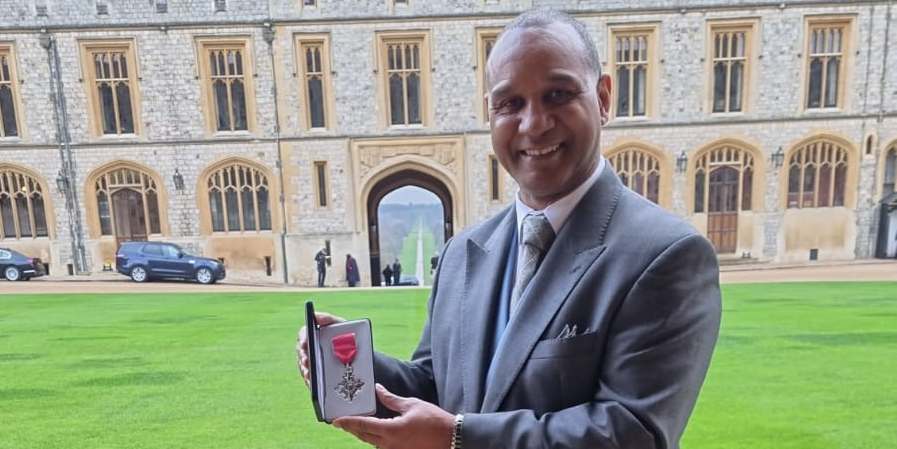Densign White, 59 yo, SIGA’s Council Vice-Chair; IMMAF’s CEO, received today the MBE award from the hands of the Princess Royal at the Windsor Castle, becoming a Member of the Order of the British Empire (MBE) for the positive impact of his sporting career.
Former judoka, Densign won the gold medal at the 1990 Commonwealth Games, and participated in three Olympic Games (1984, 1988 and 1992). The former chair of the British Judo Association (2001-2012), and former head sports director of the European Judo Union, is also chair of Sporting Equals, another SIGA committed Supporter.
In this special occasion, Densign accepted SIGA’s invitation to answer to three questions and emphasized the need for all stakeholders to unite, in order to promote clean sport.
– IMMAF is a SIGA member, and you are Vice-Chair of the Council. It’s fair to say you are fully engaged with the reform agenda. In your personal view, what are the most concerning risks facing the Sport Industry, and how do you see Sport tackling them?
– Sport faces many challenges right now and what’s disappointing to me is that large parts of the sports ecosystem seems to be stuck in the past. The style of management seems to be reactive rather than adopting proactive policies to deal with events and manage risk. The culture within the sport comes from the leadership and if that is not right then we should not be surprised when things go wrong, resulting in the image and reputation of sport becoming tarnished. I think sport can learn valuable lessons from the business sector, where they seem to have more robust recruitment processes, not only for workforce positions, but also for board appointments. Nepotism can happen anywhere, but I do have the sense that for business, unlike sport, the overriding imperative is to make a profit and to achieve that goal they need people of good character, with the right skill sets, training, and experience. I also know for a fact from my work as Chair of Sporting Equals that the business sector is doing far better than the sport sector in terms of the diversity agenda.
– Recently, The European Rugby League went through SIRVS and got certified with SILVER rating. How will this first certification impact Sport? What can be done to promote Independent scrutiny of sports organisations, and ensuring a safe place for all stakeholders?
– Congratulations to the European Rugby League for being the first international body to go through SIRVS and to achieve a silver rating. I hope that IMMAF will soon follow in their footsteps and many other International Federations too. Marking our own homework is not the way forward. The only credible audit is one that is truly independent such as the SIRVS. Organisations, Sponsors, Governments and their agencies that provide funding for sport have a responsibility and a duty of care to make sure that the recipients of their financial support have world class governance in place. Sport has had long enough to get its house in order, and enjoyed freedoms never afforded to other sectors, untouched and remains by and large unregulated. If the change we want to see is going to happen in a timely way, the funders that provide the life blood for many sports need to start to do the arm twisting. There is encouraging news that this has begun, because I read this week that the IOC have communicated to at least 3 international federations that their participation in the Los Angeles Olympic Games is seriously in doubt unless their governance improves.
– Personally, does this MBE represent an increase of responsibility regarding Sport Integrity? What message would you like to send to all sportspeople?
– My message to all sportspeople is a simple one. The first rule of risk assessment is that risk is the responsibility of everyone within an organisation. Whether you are an athlete, coach, referee, judge, administrator, or leader, we all have a responsibility to protect the integrity of our treasured sport. We must be mindful of what kind of legacy do we want to hand over to future generations to enjoy. I often feel underestimated how important sport is in our society, to our everyday lives and how it impacts on our health and wellbeing. Let’s not forget also (because I think we sometimes in the rich countries take sport for granted) that many people around the world cannot access sport because of any number of barriers including race, religion, language, gender, disability, economic and lack of investment in facilities. I should also add that these barriers are not exclusive to third world countries. There are many marginalised communities. even within developed countries. These issues concern me a lot and I want everybody to have the opportunities that sport has given to me. This is what motivates my contribution to the work of SIGA, Sporting Equals and IMMAF. Receiving the MBE in the Queens Honours list is great, but it means nothing if I cannot use it to help others. I have not forgotten my own struggles, my roots, where I have come from, and hopefully I will remain grounded and have empathy for others who are on their own sports journey.
– END –
ABOUT SIGA
SIGA is the world´s largest coalition in the field of sport´s governance and integrity. Supported by more than 100 international multi-industry supporters, SIGA is an independent and neutral organisation whose mission is to bring about meaningful reforms and enhance the integrity of all sports through a set of universal standards operated by an independent and neutral body. SIGA is the only organisation to bring together sport, governments, academia, international organisations, sponsors, business, rights holders, NGOs and professional services companies, from every region in the world, around a common cause of fostering greater integrity throughout sport.
Click on the hyperlinks for the list of SIGA Members and Committed Supporters and SIGA Partners.
For more information on SIGA, including its vision, mission and reform agenda, please refer to the website: www.siga-sport.com.
To contact SIGA, please email: comms@siga-sport.com.

